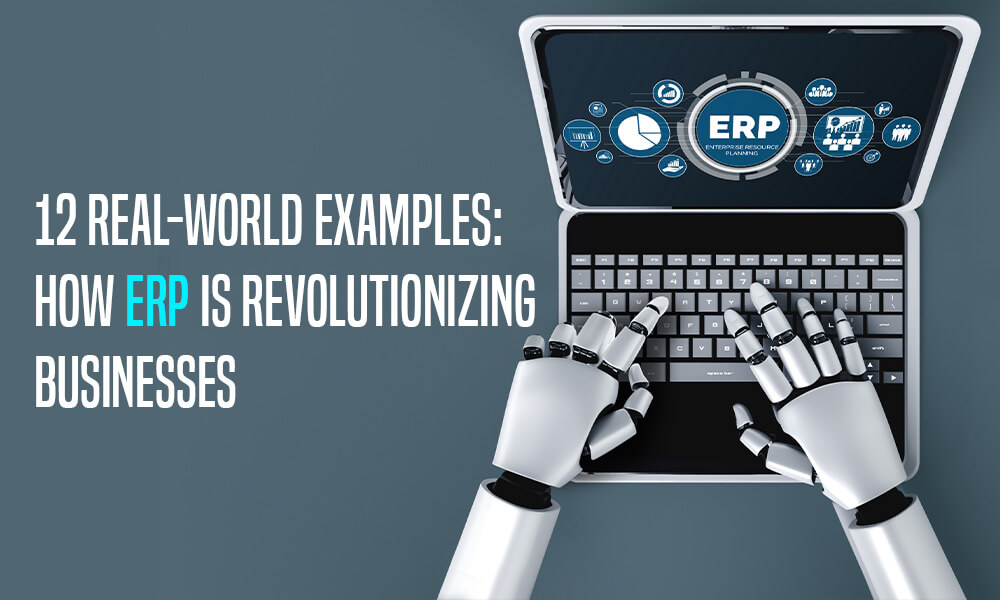Enterprise Resource Planning (ERP) software has become essential for businesses worldwide. It automates critical business processes and serves as a shared database for all financial and operational information across the company. ERP systems integrate business processes and data, improve decision-making and efficiency across functions like finance, HR, and supply chain, and are beneficial for various industries and business sizes.
In this blog, we will walk you through 12 real-world examples of how ERP is changing the way businesses work across varied sectors.
1. Streamlining Supply Chain Management
ERP systems play a vital role in streamlining supply chain management. By integrating functions such as procurement, inventory management and order management, ERP enables businesses to optimize their supply chain operations.
For example, an ERP system can automate the process of tracking inventory levels, informing businesses when inventory needs replenishing, or adjusting production schedules accordingly.
Customer Relationship Management (CRM) is essential for every successful business. ERP software integrates seamlessly with CRM systems, providing a comprehensive view of customer data and interactions. This integration allows companies to gain insights into customer preferences, track customer interactions, and automate repetitive tasks.
For example, an ERP system can automatically generate reports summarizing sales trends, customer preferences and customer interactions, enabling businesses to target marketing efforts and improve customer satisfaction effectively.
3. Enhancing Financial Management
ERP software improves financial management by providing a centralized accounting, budgeting, and reporting platform. ERP offers visibility into financial performance by integrating financial transactions with operational data.
For example, an ERP system can generate financial reports, such as income statements, balance sheets and cash flow statements, providing businesses with insights into their financial health. Additionally, ERP systems can automate financial processes, such as invoice generation and payment processing, reducing manual errors and streamlining financial operations.
4. Streamlining Human Resources Management
ERP systems streamline Human Resources (HR) processes by automating routine tasks and enabling HR professionals to focus on strategic initiatives. Additionally, ERP systems provide all employee data at their fingertips, allowing HR professionals to track employee performance, attendance and benefits, enabling better decision-making and employee management.
For example, an ERP system can automate employee onboarding, time tracking and performance management, reducing manual paperwork and streamlining HR processes.
5. Visibility of Sales and Distribution
ERP systems improve sales and distribution operations by providing insights into sales forecasts, business pipelines and customer preferences. ERP enables businesses to keep track of their customer needs, thereby improving customer experience and relations.
For example, an ERP system can generate sales orders when inventory becomes available, reducing manual errors and ensuring timely delivery to customers. Additionally, ERP systems can track sales trends and customer preferences, allowing businesses to make informed decisions about product mix and marketing strategies.
6. Ensuring Process Compliance
ERP software with compliance functionalities specific to industries allows businesses to adhere to regulatory requirements.
For example, an ERP system allows adherence to compliance by meeting regulatory requirements such as tax reporting and data protection.
ERP is revolutionizing businesses across diverse industries:
1. ERP for Manufacturing
ERP software has been a game-changer for the manufacturing industry. It streamlines the entire manufacturing process, from procurement and production to delivery. It helps manufacturers optimize their supply chain, reduce inventory costs, and improve customer satisfaction.
2. ERP for Healthcare
ERP helps healthcare providers manage real time patient data, medical records, and billing information. It also helps them to optimize their supply chain, reduce costs, and improve patient relations.
3. ERP in Logistics
ERP solutions have transformed the logistics industry by providing them with a single source for all their data. Managing their inventory, shipments and customer data becomes easy and error-free.
4. Cloud ERP Software for E-commerce
Cloud ERP software for e-commerce revolutionizes online retail by providing a centralized platform. Tailored for scalability and flexibility, it streamlines inventory management, order processing, CRM, and financial reporting. ERP software enables e-commerce businesses with real-time analytics, enhancing decision-making and adaptability in a competitive market.
5. ERP System for Government
Designed to meet the distinctive challenges of governmental organizations, ERP systems streamline financial management, human resources, procurement, and citizen services. The ERP system brings in governance, effectiveness, transparency, and citizen engagement with features such as compliance management, asset tracking, and secure data handling.
6. ERP Implementation for Non-Profit Organizations
For non-profit organizations, ERP implementation facilitates donor and grant management, program tracking, financial transparency, and volunteer coordination. Impact measurement tools help NPOs demonstrate accountability, attract funding, and efficiently achieve their mission objectives. ERP systems tailored for non-profits enable better resource utilization, fostering positive outcomes and stakeholder trust.
In conclusion, ERP software has revolutionized businesses across diverse industries, streamlining operations, enhancing efficiency and driving innovation. From optimizing supply chain management and improving financial management to enhancing CRM and safeguarding cyber security, ERP systems have become indispensable tools for modern businesses seeking to thrive in the digital space.
Here are the ERP trends to see in 2024 and know that by implementing an ERP system, organizations can overcome challenges, seize opportunities and achieve sustainable growth.
If you are considering an ERP solution for your business, SourcePro is ready to assist you with the Best ERP software in India for your business needs, which is sure to optimize and improve productivity, investments & resource utilization.
